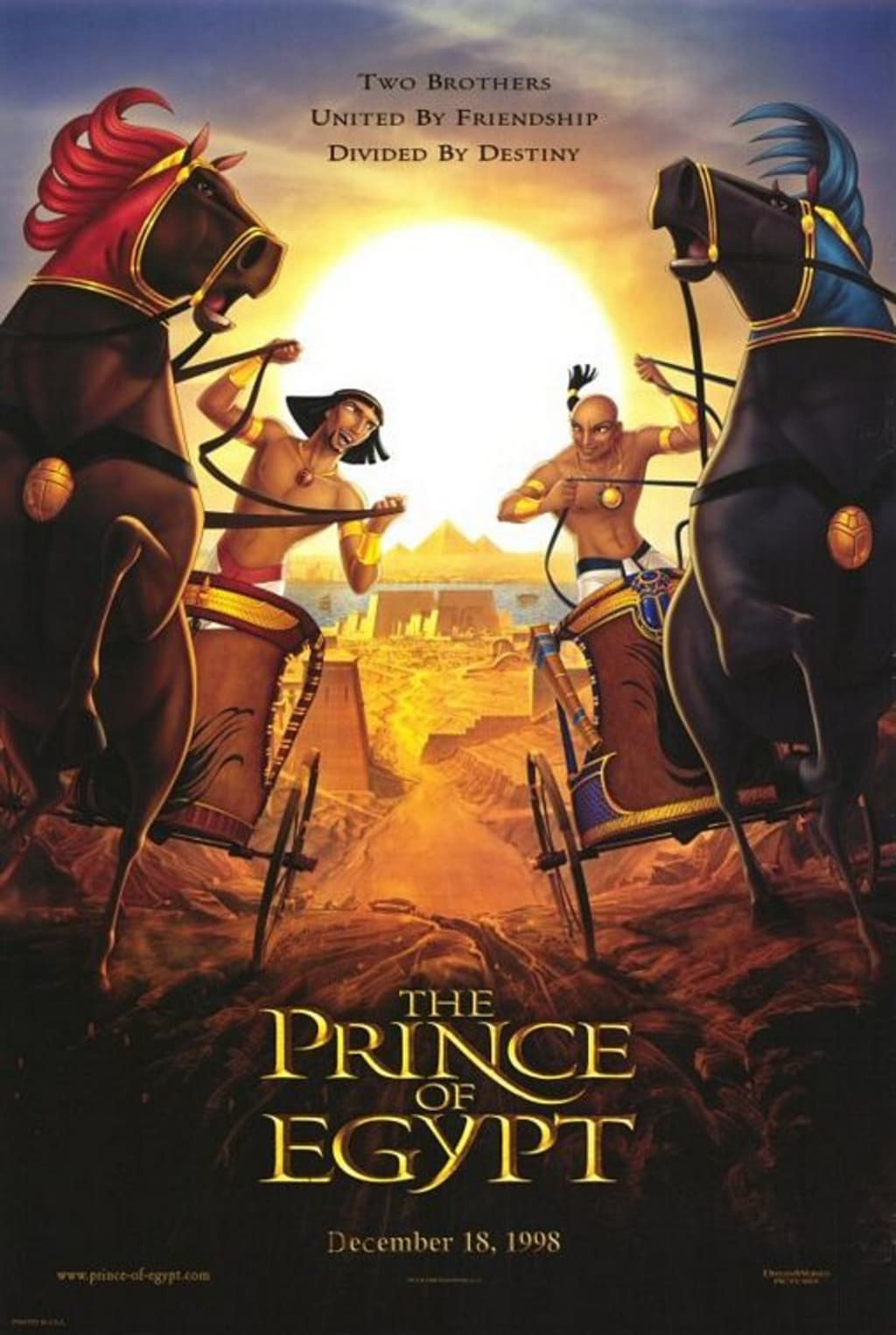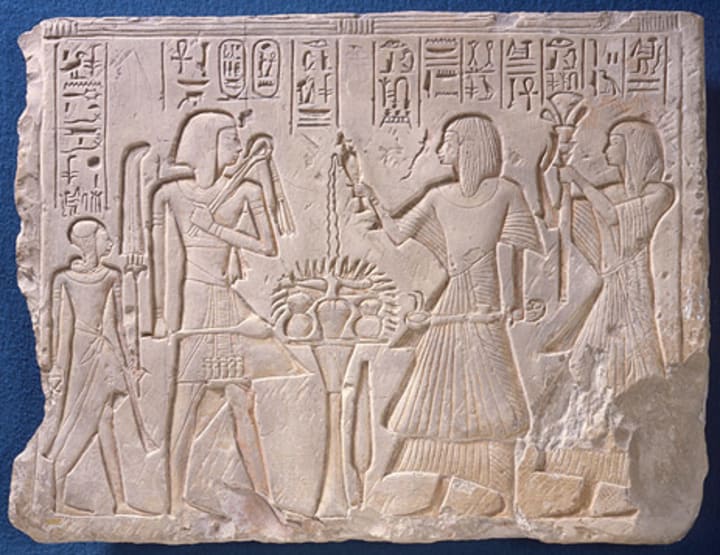The Prince of Egypt: Fact vs Fiction
How historically accurate is one of the best animated films of all time?

The Prince of Egypt will always stand the test of time as one of the best animated films produced (Oscar award winning for Best Original Song for 'When you Believe') that doesn't come under the Disney umbrella. The Prince of Egypt was Dreamworks' second animated film and grossed over $208 million worldwide. Not bad for a film pitch that was initially rejected by Disney!
As a child, I was obsessed with ancient Egypt and that love inspired me to study Archaeology and Ancient History as a degree. In fact, my final year dissertation even compared the ways in which ancient Egypt is portrayed in books and on screen. However, my point is, films like The Prince of Egypt are some of the first glimpses we see as children that teach us about the past. So, how accurate were Dreamworks in their production of this epic tale?
What inspired the film?
The Prince of Egypt is inspired by the book of Exodus in the Old Testament of the Bible. Dreamworks even invited scholars and historians of different faiths to come and consult on the film to show respect to this religious topic. In fact, it is said the reason Disney rejected the pitch in the first place is because it wanted to stay away from anything with a religious background, just in case of offending anyone.
Was the film well received?
Overall? Yes! However, in a couple of countries... it was not. Malaysia, Indonesia, The Maldives and funnily enough, Egypt, all banned the film on the grounds that any depiction of Islamic prophets (including Moses) cannot be shown in the media. Note: Indonesia later released the film on video.
Was Moses real and did he actually get sent down the river Nile in a basket?
The Book of Exodus recounts the life of a Hebrew man called Moses who is called upon by God to set free the Hebrew slaves in Egypt or in the words of the film 'let my people go'. One of the first incidents in the book, tells of the Pharaoh ordering all of the baby boys in the land to be killed (more on that later). To keep him safe, Moses' mother does indeed send him down the river Nile in a basket. Whether Moses was a real person however, does go into a debate about how reliable the Bible is as an historical document... and we won't go there in this article!
Did Moses really become a Prince of Egypt?
According to the Bible, no Moses didn't become a prince but he was brought up inside the royal court. This is where Dreamworks took a little bit of artistic license with the story. In the film, we see Moses accepted into the royal family and brought up as a true Prince of Egypt alongside his 'brother', Rameses. In the bible, Moses is well aware he is Hebrew and not Egyptian. As Moses floated down the river, the Pharaoh's daughter called for him to be picked up from the reeds and pays a Hebrew servant to nurse him. Although they ventured off slightly, Dreamworks did incorporate the same feeling of royalty vs working class, Hebrew vs Egyptian to show we need to cast aside our prejudices to work and respect one another as the human beings we all are.
Are the characters in the film true to the Book of Exodus?
To a certain extent, yes!
-Moses does marry a woman called Zipporah who was the daughter of Jethro, the priest of Midian (all correct so far, although I don't think the Jethro in the Bible would be dancing around a campfire singing 'Through Heavens Eyes' no matter how great the song is).

-Pharaoh Seti and his son Rameses, are well known figures in ancient Egyptian history and were father and son, however they are not named in the Bible. The pharaoh is simply referred to as 'pharaoh' or 'the king of Egypt'. Historians however, have agreed that Seti and Rameses are the most likely pharaohs for this time period, so 50 points to Dreamworks for doing their research.

- Interestingly, Dreamworks did downplay the role of Aaron and Miriam in the film. Aaron was Moses' older brother (by around 3 years so would have been born before the order to kill all male newborns). In the Bible, it is also emphasised how much Aaron and Moses worked together to both lead the Hebrews from Egypt, it wasn't just Moses alone as we see in the movie. Miriam was Moses' sister and in the Bible is described as a prophetess, outspoken, strong and jealous. Which shows Dreamworks, although only gave a small role to Miriam, kept the essence of her character true to the original.
Is there evidence the Hebrews were slaves to the Egyptians?
One of the most iconic scores of an animated film also lends its hand to the opening sequence of The Prince of Egypt. Deliver Us captures the desperate pleas of the Hebrew people to their lord to help them escape their plight in Egypt.
According to the Old Testament, the Israelites had been in Egypt for centuries but it wasn't a problem until their numbers started to grow and the Pharaoh was nervous that one day they would turn against the Egyptians and overthrow them.
Historians and archaeologists have debated for centuries about the historical evidence for slavery in Egypt and who these people were. Pharaohs of Egypt were constantly wanting to expand their territory, discover new trade routes and this ultimately meant invading and conquering other areas. Throughout the historical record there is evidence of prisoners of war being brought back to Egypt and put to work for the Pharaoh. Therefore, the evidence suggests it wasn't only the Israelite people who were enslaved, but instead a mix of people from conquered lands, and Egyptian workers, that built the majority of the fantastic monuments that are still standing today.
Is it possible that this mass exodus actually happened? Or is it a question of faith?
Overall, there were many occasions which historians can attribute to the Exodus in the Bible and it is still debatable if the Exodus was one mass event or a series of smaller events which were grouped together and passed down through the generations as one singular event.
Interestingly, the first mention of the Israelite people appearing in the archeological record is on the Merenptah stele in around 1210 BCE, to put that into perspective Seti I who is said to be 'the Pharaoh' in the Prince of Egypt film, was alive from 1323 BCE - 1279 BCE so it could, theoretically be the same people who fled Egypt in the Book of Exodus.
In a fantastic article by Philippe Bohstrom (which can be found here https://www.haaretz.com/archaeology/.premium-were-hebrews-ever-slaves-in-ancient-egypt-yes-1.5429843) he records that in the papyrus Anastasi VI from around 3200 years ago, it clearly describes how the Egyptian authorities allowed a group of Semitic nomads from Edom- who worshiped Yahweh - to pass the border-fortress in the region of Tjeku (Wadi Tumilat) and proceed with their livestock to the lakes of Pithom. Showing that groups of people were entering and leaving various regions in Egypt all of the time.
Another theory, is that over centuries, many different people from Canaan, Syria and the Levant were all expelled or left Egypt at some point, most notably the Hyksos people who were expelled after being overthrown by Ahmose I. The difference here being the Hyksos were rulers of Egypt and not slaves. It it impossible, without a time machine, therefore to know for definite if the Exodus described in the Bible was one single event lead by a man called Moses. Or if in fact there were many expulsions of smaller groups from Egypt over the centuries that were then pieced together and retold as one narrative. I'll let you decide!
Overall conclusion?
The Prince of Egypt, in my personal opinion, still remains one of the best animated movies ever released and the fact the subject matter revolves around my favourite time period only helps its cause. The soundtrack is phenomenal (if you haven't listened to it please do so, you'll see what I mean), their are some big name actors who suit their roles perfectly and for the most part, Dreamworks have delicately adapted a story that stays mainly true to its origins and is a complete delight to watch on screen. So whether it's for the first time, or the one millionth time, please do go and watch it and remind yourselves of this cinematic masterpiece.
The Prince of Egypt is currently streaming on Netflix UK and Hulu with options to Buy or Rent on other streaming platforms.
About the Creator
T. Freya Taylor
Im Freya, archaeologist, teacher and proud Ravenclaw and officially a published author (check out ‘The Mummy’s Curse: Secrets and Senet!) I’m fuelled by my passion for ancient history, culture and mythology, especially ancient Egypt.






Comments
There are no comments for this story
Be the first to respond and start the conversation.